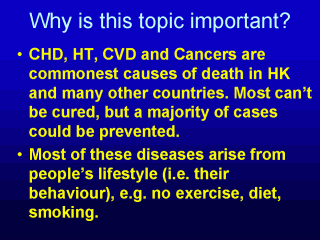 |
Why?
As previous lectures have already shown, behaviour is a principal factor in the current
epidemic of chronic diseases. Most of the major degenerative, chronic conditions that clog
up health care services are incurable (which is why they’re chronic) without major
transplantation technology, which is extremely expensive and replacement organs tends to
develop the same problems as the original organs, unless recipients change their behaviour
patterns significantly. For infectious conditions, such as TB, HIV/AIDS and hepatitis,
behaviour is even more crucial. TB is the most important infectious disease on the planet
and kills more people than any other, even though cheap and effective treatments exist,
and growing antibiotic resistance is a result of human behaviour, including that of
doctors. |
